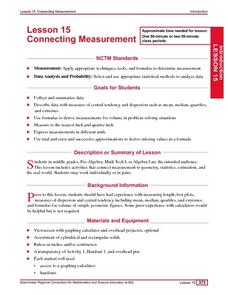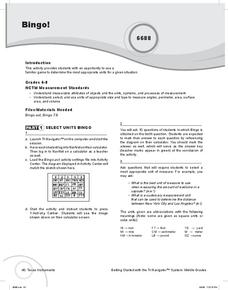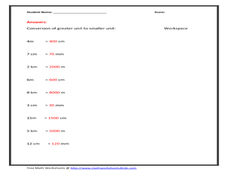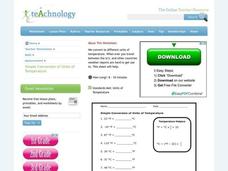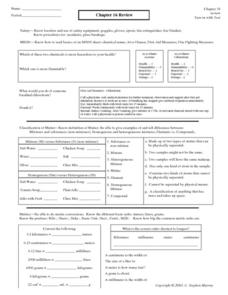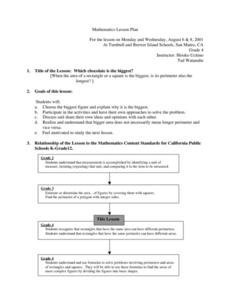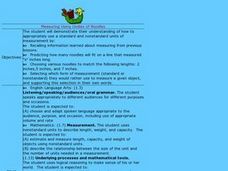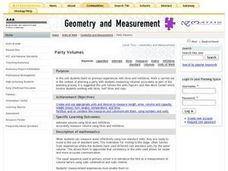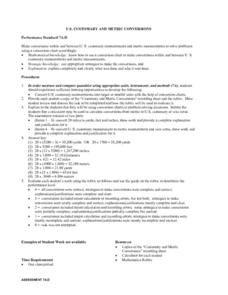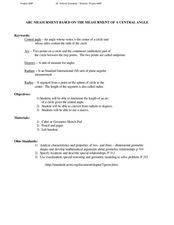Curated OER
Customary Measurement Conversions
Fifth graders discover in hands-on activities the relationships between the measures. They work in groups to create conversion tables using familiar measuring tools. Students solve problems requiring conversions.
Curated OER
Exploring Customary and Metric Systems
Students investigate and measure using the metric and customary units. In this math lesson, students investigate which method is used most worldwide, the metric or the customary. They convert from unit to the other.
Curated OER
Connecting Measurement
Students participate in activities the connect measurement to geometry, statistics, estimation, and the real world. They collect measurements from their elbow to the tip of their middle finger and make a box plot of the data as well as...
Curated OER
Boxing On
Students participate in five center activities in which they construct three dimensional objects using cubic centimeter manipulatives such as sugar cubes and toothpaste boxes. They determine the volume of the objects. They build a model...
Curated OER
The Royal Cubit
Students explore the history of measurement in ancient Egypt. In this math lesson, students discuss the development of a standardized measurement system. Students measure using various units and discuss the results and the need for a...
Curated OER
Bingo
Students practice determining the most appropriate units for a given situation while measuring attributes of objects, systems and processes of measurement. They review the concepts of angles, perimeter, area, surface area and volume.
Curated OER
Convert Standard Metric Units-Length
In this conversion learning exercise, students convert numbers shown in greater units to smaller units. Answers are included on page 2.
Curated OER
The Smallest Metric Measurements
In this metric measurement worksheet, students solve 15 problems in which three metric measurements in a series are analyzed. Students circle the smallest metric measurement in each problem.
Curated OER
Chapter 16 Review- General Science
In this review of general science worksheet, students classify examples of matter as mixtures or substances, homogeneous or heterogeneous mixtures, or elements or compounds. Students also convert several examples using the standard...
Curated OER
Printable Paper Rulers
In this math resource worksheet, students can print out paper rulers. They choose between 20 different rulers that are different widths, and are delineated with standard or metric measurements.
Curated OER
Estimation Task
Upper graders practice their estimation skills by observing different objects then making their best guess without using measuring instruments. Students are asked to estimate mass, length, volume, and area.
Curated OER
Height and Weight
Third graders explore their height and weight. They measure the heights and weights of their peers. Students record their data using an Excel spreadsheet. They create a graph to compare the data and analyze it for a correlation between...
Curated OER
Which Chocolate Is The Biggest?
Students investigate the concepts of area and perimeter with the use of chocolate bars. They calculate the perimeter and area of different size rectangle chocolate bars and record the statistics. Then students make a visual comparison...
Carnegie Mellon University
Battery Workshop
Introduce your class to the workings and parts of a battery-operated circuit. Pairs of pupils use lemons to make batteries and measure voltage and current with a multimeter. An accompanying worksheet is used for recording values and...
Curated OER
Shoe Showdown
Third graders use rulers to measure their shoe size in inches and centimeters. They then enter the class shoe measurements into an excel data base and graph the results of both to make the comparison.
Curated OER
Unit 1 Matter and Energy
Topping this worksheet is a comprehensive collection of notes about phase changes. The phase change graph is displayed, along with formulas for the gas laws, and information relating energy to change of phase. After reviewing these...
Teach Engineering
Capillarity – Measuring Surface Tension
How do cohesion and adhesion work together? The third installment of a nine-part series teaches young scientists the difference between adhesion and cohesion. They also learn how cohesion and adhesion work together to cause capillary...
Statistics Education Web
The United States of Obesity
Mississippi has both the highest obesity and poverty rate in the US. Does the rest of the data show a correlation between the poverty and obesity rate in a state? Learners tackle this question as they practice their skills of regression....
Illustrative Mathematics
Latitude
The greater the latitude, the less of the Earth is north. Scholars graph the relationship between the latitude and the percentage of the Earth that is north of the latitude. Using the graph and the table, class members interpret values...
EngageNY
End-of-Module 3 Assessment Task
Let's see what the class learned! The last installment of the 23-part Pre-calculus module consists of nine assessment questions designed to measure a specific portion of a standard in the unit. Learners demonstrate their understanding of...
Curated OER
Measuring Using Oodles of Noodles
First graders explore and evaluate the use of both standard and nonstandard forms of measurement. They use noodles to measure the lengths of each line they have drawn. They glue the noodles to the page under the given line.
Curated OER
Party Volumes: Measurement
Second graders explore liters and milliliters. They estimate volume and accurately measure the volume. Students plan a party and measure volume using liters and milliliters as part of the planning process.
Curated OER
U.S. Customary and Metric Conversions
Students convert U.S. customary measurements into larger or smaller units with the help of conversion charts. They are explained that they are going to use conversion charts in problem solving situations. Pupils use a calculator to...
Curated OER
Measurement of a Central Angle
Students calculate the measurement of a central angle. In this geometry activity, students identify properties of circles. They use Cabri software to create and analyze graphs.




